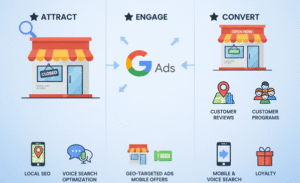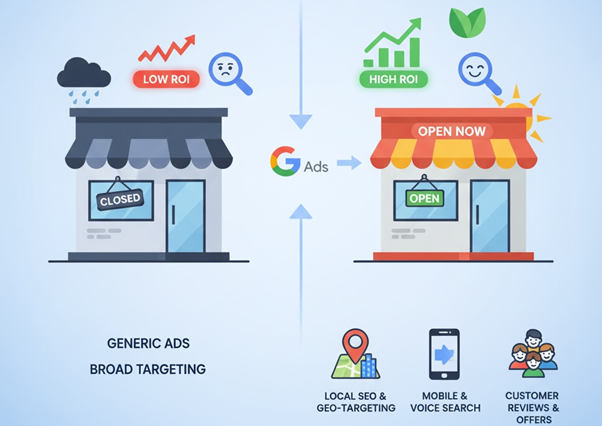There’s something frustrating about watching money disappear into advertising with nothing to show for it. A salon owner in Pune told me last week that she’d spent ₹65,000 over four months on campaigns that barely brought in any new clients. When I looked at her account, the problem jumped out immediately—her ads were showing to people 200 kilometers away who would never drive that far for a haircut.
This happens constantly with local businesses. They set up campaigns thinking geographic targeting will be simple, then wonder why they’re paying for clicks from people who can’t possibly become customers.
The Local Business Problem
Running a local business creates unique advertising challenges that national brands never face. Your customers need to be within driving distance—maybe 10 kilometers, maybe 20, depending on what you offer. Go beyond that radius and every click becomes wasted money because those people aren’t coming to your location no matter how good your ad looks.
Market saturation makes things harder too. Even businesses with limited budgets face competition from dozens of similar services in their area. Standing out when everyone’s fighting for the same local audience requires smarter strategy than just bidding on obvious keywords. You can’t outspend bigger competitors, so you need to outthink them instead.
Then there’s the “near me” search phenomenon that’s completely changed how people find local services. Nearly a third of people search for local businesses online at least once daily, usually on mobile devices while they’re already out and about. If your business doesn’t show up in those critical moments when someone needs your service right now, you’ve lost the opportunity before you even knew it existed.
The tracking gets complicated too. Local businesses need to know which campaigns drive phone calls, which ones bring people to physical locations, and which ads generate online bookings or form submissions. Without proper tracking for each conversion type, there’s no way to know what’s working and what’s burning budget.
Most small business owners I meet say lead generation and budget constraints are their two biggest marketing challenges. They need results fast because they can’t afford to experiment for months, but they also can’t invest unlimited money figuring out what works. That pressure creates a tough situation where mistakes get expensive quickly.
Why Geographic Targeting Makes or Breaks Campaigns
Getting location settings right is absolutely critical for local businesses, yet it’s where most people mess up. The platform lets you target by country, state, city, zip code, or even create a custom radius around a specific address. But here’s the trap—there’s a setting called “presence or interest” that will show your ads to anyone interested in your location, even if they’re physically nowhere near it.
Imagine running a restaurant in Bhubaneswar with that setting enabled. Your ads might show to someone in Delhi who once searched for “best restaurants in Bhubaneswar” because they were planning a trip months ago. You pay for that click, they can’t actually visit your restaurant, and that money is gone forever. This single mistake wastes thousands of rupees monthly for businesses who don’t know better.
The better approach uses “presence” targeting—only showing ads to people physically in or regularly visiting your target area. Combined with radius targeting around your business location, this ensures every person who sees your ad could realistically become a customer. For service businesses that travel to customers, you can exclude specific neighborhoods or areas you don’t serve to avoid wasting budget.
Geotargeting goes even deeper with advanced strategies like geofencing, which triggers ads when potential customers enter specific zones—like your location, competitor locations, or relevant events. Research shows campaigns using location data see an 83% improvement in effectiveness compared to generic targeting. That’s not a small difference—it’s the gap between campaigns that work and campaigns that drain budgets.
Timing matters too. A coffee shop should increase bids during morning commute hours when people are most likely searching for breakfast options nearby. A restaurant might push dinner ads between 4-7pm when people are deciding where to eat. This kind of dayparting optimization ensures budget goes toward the moments when conversions are most likely.
Local Services Ads Change the Game
Beyond regular search campaigns, there’s a specific ad format designed exclusively for local businesses that most owners don’t even know exists. Local Services Ads appear at the very top of search results, above everything else, connecting service providers directly with nearby customers actively searching for their services.
The pricing model alone makes these incredibly valuable. Instead of paying per click like regular ads, Local Services Ads use pay-per-lead pricing—you only pay when someone actually contacts your business through a call or message. No more paying for clicks from people who visit your site then bounce without taking action. You’re literally paying only for genuine leads from potential customers.
There’s also the Google Guarantee badge that comes with Local Services Ads, which provides huge credibility. This badge tells customers that if they’re unsatisfied with the service, they can get a refund within certain limits. That trust signal reduces friction in the decision-making process because customers feel protected choosing your business over competitors without the guarantee.
The qualification process requires verification and background checks, which creates a higher bar than regular ads. That might seem like a hassle, but it actually benefits qualified businesses by reducing competition from less-serious providers. When customers see your Google Guaranteed badge, they know you’ve been vetted, which immediately sets you apart.
Lead management gets simplified too. The platform provides built-in features for tracking leads, managing customer communications, and even recording calls for quality review. All the performance data lives in one dashboard showing leads received, costs per lead, and overall campaign performance. For busy business owners who don’t have time to dig through complex analytics, this simplification is valuable.
Why Professional Management Transforms Local Campaigns
This is exactly where working with a google ads agency becomes a game-changer for local businesses. Professionals understand the nuances of geographic targeting that make or break local campaigns. They set up location targeting correctly from day one, ensuring ads only reach people who can actually become customers.
They also know how to segment audiences based on local behavior patterns. Someone searching “emergency plumber” at 2am has very different intent than someone searching “plumber near me” on Tuesday afternoon. Agencies create separate campaigns for these different customer segments, with tailored messaging and bidding strategies for each.
The keyword strategy looks different for local businesses too. Instead of broad, generic terms that attract national competition, professionals focus on location-specific keywords that signal local intent. “Best salon in Koramangala” or “emergency electrician Banjara Hills”—these longer, location-specific searches have less competition and higher conversion rates because the searcher has already narrowed down their geographic preference.
Landing page localization matters enormously as well. When someone clicks an ad specifically targeting their neighborhood, the landing page should acknowledge that with local references, address information, service areas, and even local testimonials. This consistency between ad and landing page improves conversion rates because visitors feel like they’re in the right place.
Then there’s the competitive intelligence piece. Professional managers analyze what other local businesses in your category are doing—which keywords they bid on, what ad copy they use, where they’re showing up in search results. This competitive analysis reveals gaps you can exploit and strategies worth copying. Maybe competitors are ignoring certain neighborhoods or missing key search terms—those become your opportunities.
The Multi-Platform Strategy

Here’s something most local businesses miss: search ads work better when combined with other channels. Someone might discover your business on Facebook, then later search for your business name specifically when they need your service. Or they see your display ad around the web building awareness, then you capture them with search ads when they’re ready to act.
Social media excels at building awareness and interest among local audiences who aren’t actively searching yet. Facebook’s geographic targeting is incredibly precise—you can target specific neighborhoods, demographics, and interest categories. Combined with search ads that capture active demand, this creates multiple touchpoints that reinforce your brand and drive conversions.
The data from one platform also informs strategy on others. If certain ad messaging performs well on social media, that same angle might work in search campaigns. If specific neighborhoods generate the most leads from search ads, you can create targeted social campaigns for those same areas. This cross-platform learning accelerates optimization across all your marketing efforts.
Making It Work for Your Business
Running successful local advertising campaigns isn’t about having the biggest budget—it’s about strategic precision that makes every rupee count. When a google ad marketing agency sets up campaigns correctly from the start, local businesses see results within weeks instead of wasting months on trial and error.
I’ve watched businesses completely transform their customer acquisition by making one smart decision—partnering with professionals who understand local market dynamics. A home services company was spending ₹90,000 monthly getting random clicks from all over their state. After restructuring campaigns with proper geographic targeting, optimized keywords, and Local Services Ads, they were generating twice as many qualified leads at 40% lower cost per lead.
That kind of improvement happens when strategy aligns with reality. Local businesses have unique advantages that national brands can’t replicate—community connections, local knowledge, personalized service. Smart advertising amplifies those advantages by reaching the right people at the right moments with messaging that resonates.
The alternative is continuing to fight with one hand tied behind your back. Competing against businesses that understand these strategies while using generic, poorly-targeted campaigns is like bringing a butter knife to a sword fight. You might land a lucky hit occasionally, but you’re fundamentally outmatched by competitors who know what they’re doing.
Professional management isn’t an expense—it’s the difference between campaigns that drain your budget and campaigns that actually grow your business. Better targeting, smarter bidding, optimized messaging, and continuous refinement based on performance data—that’s what separates businesses that thrive from businesses that struggle wondering why advertising “doesn’t work” for them.


